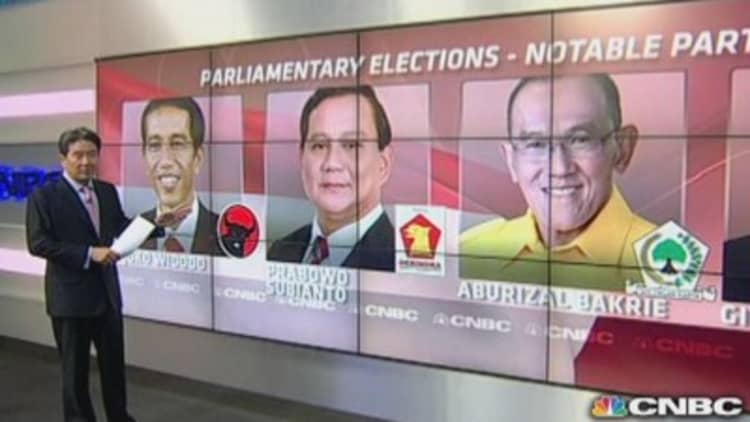
Indonesians are headed to the polls Wednesday to choose a new parliament, with the outcome set to determine the course of the country's reforms and whether the market's recovery continues.
The elections "come at a crucial time, with the economy stuttering and confidence in the current leadership at a low ebb," said Capital Economics in a note Monday. "The parliamentary elections still matter in terms of the eventual president's ability to guide policy."
Read MoreIndia and Indonesia: Not so bad after all?
The country's around 186 million voters will be choosing 560 members of parliament from among around 6,600 candidates representing 12 political parties. Only parties getting at least 25 percent of the popular vote or 20 percent of the seats in parliament will be able to field a presidential candidate in the July presidential election.
"If its outcome suggests higher potential of a one-round July presidential election, this would be market positive," CIMB said in a note Friday.
The current governor of Jakarta, Joko Widodo, widely known as Jokowi, is believed to be the presidential favorite, rising to the top of opinion polls. He is seen as a reformist and a clean politician who has not used his governorship for personal enrichment.
"Jokowi is certainly a very, very good figure to calm the markets," Edward Lee, regional head of research at Standard Chartered, told CNBC.
Read MoreIndonesia Finance Minister: No deficit issue in 2014
Expectations that a new government will be able to push through reforms has helped Indonesia's market become one of the region's best performing this year after it was hard-hit in last year's emerging market selloff in the wake of the U.S. Federal Reserve's move to begin tapering its asset purchases.
Indonesia's central bank has hiked rates five times since the middle of last year to prop up a crumbling currency, which dropped 26 percent last year.
Read MoreWill Indonesia's minerals ban hurt its current account?
While the economy, the biggest in Southeast Asia, grew a better-than-expected 5.72 percent on year in the fourth quarter, economists say political uncertainty, the impact of monetary tightening and a controversial mineral export ban will all be headwinds in the coming months.
Other analysts are also positive on Jokowi's candidacy.

"As governor of Jakarta, he's proved his mettle in terms of one, not being corrupt (and) number two, being able to deal with the issues that matter to the people," Amarjit Singh, senior analyst at IHS, told CNBC.
Stamping out, or at least minimizing, corruption is likely the biggest issue for the election. Transparency International scores the country at 32 out of 100 on its corruption perception index, with 0 signaling highly corrupt and 100 as very clean, which gives it a ranking of 114 out of 177 countries.
Other issues include job security and wages as well as inflation and infrastructure development.
Read MoreRecovery strong but risk shifts to emerging markets: IMF
If Jokowi's party, the opposition Eh - PDI-P or the Indonesian Democratic Party-Struggle led by former President Megawati Sukarnoputri, doesn't garner enough votes in this election, he may need to form a coalition with another party. This may cost him the ability to choose his running mate and limit his ability to push needed reforms.
However, Singh noted that Jokowi as well as the other candidates have yet to announce economic platforms.
"At this stage, everybody is running on personalities and hoping that the personality behind the party can carry the party forward," he said.
Among other popular parties, the Greater Indonesia Movement Party, or Gerindra, is led by Prabowo Subianto, a former special-forces commander, who may also throw his hat in the presidential ring.
Read MoreElection year for emerging markets: What to expect
Another potential candidate is businessman Aburizal Bakrie from Golkar, the party of former strongman Suharto.
The Democratic Party of current President Susilo Bambang Yudhoyono has been falling behind in the polls. It plans to hold a convention to choose its presidential candidate. Harvard-educated former trade minister Gita Wirjawan has said he will participate in the convention.
—By CNBC.Com's Leslie Shaffer; Follow her on Twitter @LeslieShaffer1

